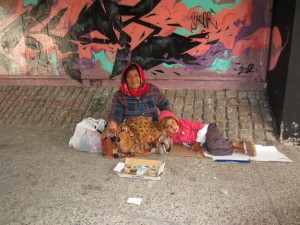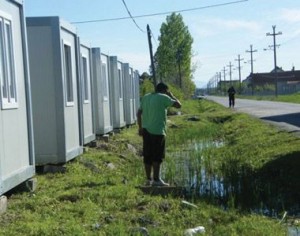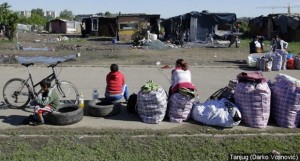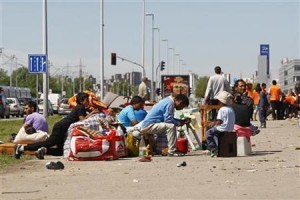Expat Perspective on Gypsies—Serbian Mentality Mini-Series Part II

When I first saw a Gypsy settlement, I was surprised and appalled by two things:
- The complete and utter squalor in which they appear content to live, and
- The seeming callous indifference shown toward them.
Last week I addressed the (mis)perception, “All Serbs are war criminals,” as the 1st part of a mini-series on understanding the Serbian mentality. In Part II, I want to look at stereotypes surrounding Gypsies—or the more PC term Roma.
With Serbia’s efforts to join the EU, the international community wants Romani needs addressed. The “homes” pictured above have no indoor plumbing. Electricity is either bootlegged or non-existent. Living conditions are a health and fire hazard, not to mention a depressing eyesore.
It would be great to help them. Women in particular are disadvantaged, have a low life expectancy, and are used as prostitutes and baby factories.
Truly, Romani are some of the most despised ethnic minorities in all of Europe, but I didn’t understand why and how this came to be.
A valuable stereotype: Tigers are dangerous
Let me back-track a bit. Stereotypes get started when we observe a trend in human behavior and draw conclusions.
The ability to deduce was what allowed early man to avoid being eaten by tigers. That’s a good thing.
I know, I’m prejudiced against tigers! Yes … I’m sure not all tigers are dangerous. Riiiight … But you’re not gonna see me petting a “tame” tiger.
I digress. What were we talking about? Oh yeah, stereotypes.
I didn’t even know I was prejudiced, until …
Shortly after moving here, I wondered, Why do Roma live in shacks? Why don’t they take advantage of state-sponsored health care and education?
I felt really bad about the whole situation, until I was accosted by a few Romani outside Delta City, a Western-style mall in New Belgrade.
A few boys approached me, asking for money. I spoke, then shouted—in English, which the boys thought was hilarious. Unnerved, I quickly gathered my infant and toddler, and hustled towards the mall entrance. The boys followed closely.
Finally, a taxi driver jogged over yelling, “Bege,” which means “shoo,” like you shoo away pigeons, and the boys dispersed. Nothing bad happened, well, except now I’ve formed my negative opinion.
Who are the Roma, anyway?
Originally from the Indian subcontinent, Roma are a dispersed people, with their largest populations concentrated in Central and Eastern Europe.
The Roma are a historically disenfranchised group, treated horribly throughout all of Europe for hundreds of years. During WWII, the Nazis marked the Roma for extermination. [Just a historical note: Serbs resisted the Nazi invasion, much to Hitler's dismay. Hundreds of thousands of ethnic Serbs were sent to concentration camps and executed, along with Jews and Roma.]
Today, one of the biggest problems is the Romani desire to stay “off the grid” in every possible way.
Recently, a couple hundred Roma were unhappy to be relocated from their settlement in New Belgrade.
See that blue sign on the upper right? Yeah, that’s Delta City about a block away.
Here’s a photo of the metal containers they were provided as housing about twenty miles away:

Romani dislike these metal containers, they lack air-conditioning and are too hot. August 2012 danas.rs
Amnesty International, an organization I truly respect, condemned the eviction. They stated that Roma will be living in metal boxes for years to come. Okay … now scroll back up the very first photo in this post … See in the background? The shoddily designed shacks of various materials and questionable stability?
Yeah, that’s how the Roma were living.
Now, they live in “metal containers,” provided by the (poor) Serbian government. Much nicer by comparison, note also the electrical lines and paved roads within the settlement itself.
So What Gives? Why are Roma treated with such contempt?
I get it, the Roma need a help up. But how? In what form?
There have been stories of Roma gutting their governmental housing, taking the toilets and sinks and copper wiring and heading back to reconstruct their settlements.
So that begs the question, What is the best way to get the Roma to assimilate? What if they don’t want to assimilate? What then?
As far as I can figure out, the biggest frustration is it appears the Roma prefer their “freedom,” working when they want, having little responsibility, and enjoying life on their own terms.
So many people here in Serbia struggle to get by, to pay their bills, to make something of themselves using the tools they have available. The feeling is, If the Roma don’t want help, why should we spend our limited resources?

Letting a grandma and a kid beg in a dirty underpass is not considered a shameful activity by Romani standards. This I can’t wrap my head around.
I’m not sure what the best solution is. It’s something the Serbian government struggles with: What changes can be made that will help Romani over the long-term?
The funny thing about stereotypes is that the moment we say, “All Roma are XYZ,” someone will easily point to an exception. Not all Roma are beggars. I get it. But at this point, I’m not taking any chances.
Tiger photo: freedigitalphotos.net







What you say about the Roma living in delapidated buildings and being accused of petty crimes, begging etc. seems to be all over Europe. I was in Austria with my husband (he is Austrian) and we witnessed a robbery, the first robbery he's seen in his whole life. And the assaultors were Roma. My husband cracked down hard with stereotypes about Roma, always begging, robbing etc. But I think you can see these stereotypes across the world in minority communities, in California you can check out the living conditions of the migrant farm workers, just as bad as the Roma in Europe and lets be honest, Mexicans are often looked down upon and assumed to be criminals more often then white people. It seems to me that there tends to be problems in minority communities where people don't feel that they belong or fit into a society.

Jessica Holt recently posted..British words you should incorporate into your vocabulary
Jessica Holt recently posted..British words you should incorporate into your vocabulary
Jessica, Thanks for sharing your experience! It is an issue of poverty, lack of economic opportunities, I agree. But with the Roma it seems like it's something more. Mexicans in the U.S. often cross the border with the intention to work, find a better life. Yes, there is crime and poverty among migrant farm workers. Perhaps Roma have been on the out-skirts of society for so long, they simply don't want to try to fit in. I'm not sure what can be done that will be successful in helping them over the long term!
I appreciate you commenting, it's great to "meet" you!
Laura
i think people should do more effort to take care of them
i never saw them in real life but we have people with similar problems here in Egypt where i live

farouk recently posted..How to give a motivational speech to a friend or to yourself
farouk recently posted..How to give a motivational speech to a friend or to yourself
There are 2 types of them: assimilated who live in homes, work in offices, take their children to school, etc; and Cherga Gypsies (free travelers, nomads, those who stay away from modern lifestyle, regulations, laws, etc.) The second group has a trait they call "Gypsy vicious circle". They can't escape from it and they actually don't want to escape. It's a bit like this:
They don't send their kids to schools, saying "schools can't teach them Gypsy ways (of life; they'll learn to write and read, but they don't need such skills in their nomadic lifestyle). Which leads to – no knowledge of a possible easier life, no chances of getting better paid jobs, which leads them to stick to their hard life.
They also get married from the young age and women already have some children by the age of 15 and keep giving births on and on (altho they live in harsh conditions). But they do it all away from institutions – they don't sign legal documents about marriages, so states don't even know of their marriages (which would be illegal in first place because of such young age), they bring their babies to the world in their huts, not in hospitals, so the babies don't get documented by states (babies would probably be taken away from them, in hospitals, if social workers would find out in what conditions they'd be destined to live). Which leads to no IDs, which leads to no chance of going to school or having public health insurance. Which closes the circle.
Not sending kids to school is forbidden by the law and for such behavior, parents would be imprisioned, in normal cases. But, firstly, states have no evidence of those kids, or their parents and secondly who'd feed the rest of the family if parent's go to prison?
Then, all other kids would have to be given to adoption, but their adult kids and old grandparents would have to fend for themselves. Then, what if you catch those adult kids and grandparents without IDs? They go to prison as well. What do you do when they serve their time? Let them roam again? Consider them as illegal immigrants and send them across the border? Where? There's no Roma country to take them.
So, put it simply, they want to live such, as we perceive it, harsh life. Like Amish people, except it doesn't look that romantic. Recently, their huts have been leveled under a bridge somewhere in New Belgrade and given those metal containers (water, sewage, electricity, heating), paved roads, schools, playground for their children… on the outskirts of the city. Reaction of half of them was – it's a camp, we're far away from the town, we can't beg, we can't collect rubbish, we can't bootleg electricity, etc. WTF?
Before, the city gave them flats all around Belgrade, not on the outskirts, real flats in real concrete buildings. Most of them couldn't live there, because they didn't have money to pay bills, because they didn't have well paid jobs, because they didn't go to schools, because they didn't have IDs, because they were born in their travel camps (that vicious circle)… So they SOLD flats GIVEN to them for FREE (provided by taxpayers), got money and built HUTS again on another stretch of someone's land and kept collecting rubbish and begging again.
And then, somebody from West writes articles in their newspapers how Serbia is forcefully destroying their homes (built without permission on city's land) and forcing them to live in ghettos away from the city (again on the city's land). And then they say "people should do more effort to take care of them" – like if they're stray dogs, not humans with free will. They, obviously, don't want to be taken care of. Feel sorry for them if you can.
Mostovljanin,
Thanks so much for writing, I agree it's a vicious circle. And, I really don't know what the solution is. I know there are some children and young adults who, if they could know of a better life, would want it.
The Serbian government is trying to help, but some of the articles from Western media that I've read on the topic are incorrect and sad to the point of being humorous. Like, they interviewed a Roma man who complained that his land back in Kosovo was "stolen by his cousin," That's why he couldn't return. No caveats or explanations. … The reality in phrasing is that a cousin is not necessarily the child of your aunt or uncle–that word (if this man was speaking Serbian, I'm not sure, as the article was written in English) can refer to any type of extended family member who is of a similar generation. Did this man even OWN the land in the first place?
But thanks again for writing. Serbia has "lost the media war" for decades now.
This is very attention-grabbing, You are an excessively skilled blogger. I’ve joined your feed and look ahead to in the hunt for extra of your excellent post. Additionally, I’ve shared your site in my social networks
Navient Loan
Navient
Navient Loan
Navient Customer Service
Navient Student Loan